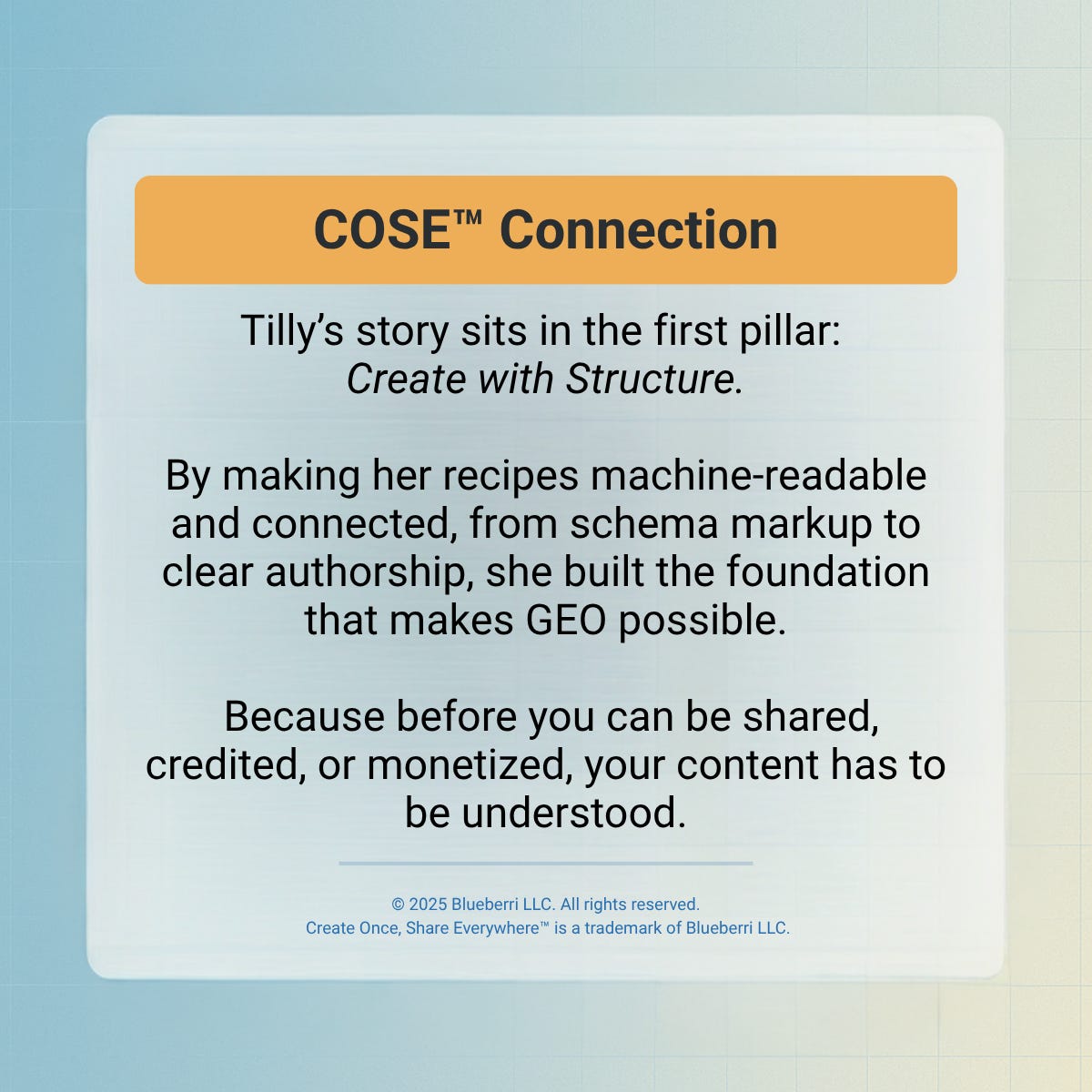Generative Engine Optimization Isn't SEO
How AI is changing food search and why structured recipes rise to the top
Search isn’t what it used to be.
A few years ago, ranking on page one of Google meant visibility. Creators fought for clicks, optimized their headlines, and learned how to speak in keywords. But today’s search results are being replaced by something entirely different: generative engines.
These systems, like ChatGPT, Google’s AI Overviews, and Perplexity, don’t just list links. They generate answers. They summarize information, weave together insights, and deliver context in a few sentences that never require a click.
That shift is quietly rewriting the rules of discoverability.
Where SEO once focused on what people typed, GEO—Generative Engine Optimization—focuses on what engines understand.
Generative engines aren’t scanning for perfect keywords. They’re looking for structured data, contextual clarity, and trustworthy signals that help them decide:
Who created this content?
How credible is it?
What relationships exist between pieces of information?
And that’s where most creators are getting left behind.
If your content isn’t structured, if it doesn’t have clean metadata, clear authorship, or internal relationships, it can be used without attribution.
Your ideas might show up inside someone else’s AI-generated answer, stripped of your name, your link, and your hard-earned visibility.
That’s why GEO matters. It’s not another algorithm to chase, it’s a call to clarity.
GEO rewards creators who treat their content like data: labeled, connected, and ready to be read by both humans and machines.
For food creators, that means recipe schema isn’t optional anymore—it’s essential.
Your metadata, taxonomies, and relationships between posts are what teach generative systems who you are and what you stand for.
Because the future of search isn’t about being found.
It’s about being recognized.
Learn more in the complete guide: Generative Engine Optimization for Food Creators
The Algorithm Ate My Cookie
When Tilly first started her blog, Whiskful Thinking, she thought she was doing everything right.
She had the pastel brand palette. The well-lit reels. The keyword-researched titles like “The Best Gluten-Free Chocolate Chip Cookies.”

But then she noticed something weird. Her analytics dropped—but not because she’d stopped posting. Her recipes were showing up in AI summaries, not search results.
She’d ask ChatGPT for “easy gluten-free desserts,” and there it was—a description of her exact cookie recipe.
Just without her name.
What Tilly Discovered: GEO
After a mild panic scroll through Reddit, Tilly landed on a new term: Generative Engine Optimization (GEO).
GEO is the process of making your content discoverable inside generative engines—the systems behind AI tools like ChatGPT, Perplexity, and Google’s AI Overviews.
It’s not about “gaming the algorithm.” It’s about teaching those systems who you are, what you’ve made, and how to cite you correctly.
In other words: visibility through structure.
Applying the COSE™ Framework
Tilly didn’t need to start over—she needed structure.
She focused on the first pillar of COSE™: Create with Structure.
She went back through her blog and:
Added
authorandorganizationmetadata to every recipe postStructured ingredients, instructions, and nutrition in schema markup
Created canonical URLs so search engines and AI systems knew her site was the source
Connected every recipe to a “collection” (e.g., Holiday Desserts, Cakes & Cupcakes, 5-Ingredient Recipes)
Within weeks, she started seeing her blog cited again—this time, by name—in Perplexity and summaries and AI search results.
What Food Creators Can Learn from Tilly
The world of discoverability is shifting—from links to language models.
And those models are trained to understand structure, not style.
Here’s what that means for you:
Your metadata matters. It’s not extra; it’s essential.
Your authorship fields protect you. Without them, generative engines can’t credit you.
Your site relationships guide understanding. When recipes link through shared tags or taxonomies, AI recognizes your expertise pattern.
Or as Tilly put it in her latest post:
“GEO isn’t scary, it’s just SEO with better boundaries.”
Your Turn
If a generative engine pulled from your content tomorrow, would it know it was yours?
Hit reply or comment below, what part of GEO feels most confusing or urgent for your site?
Your friend in food,
Sandie




